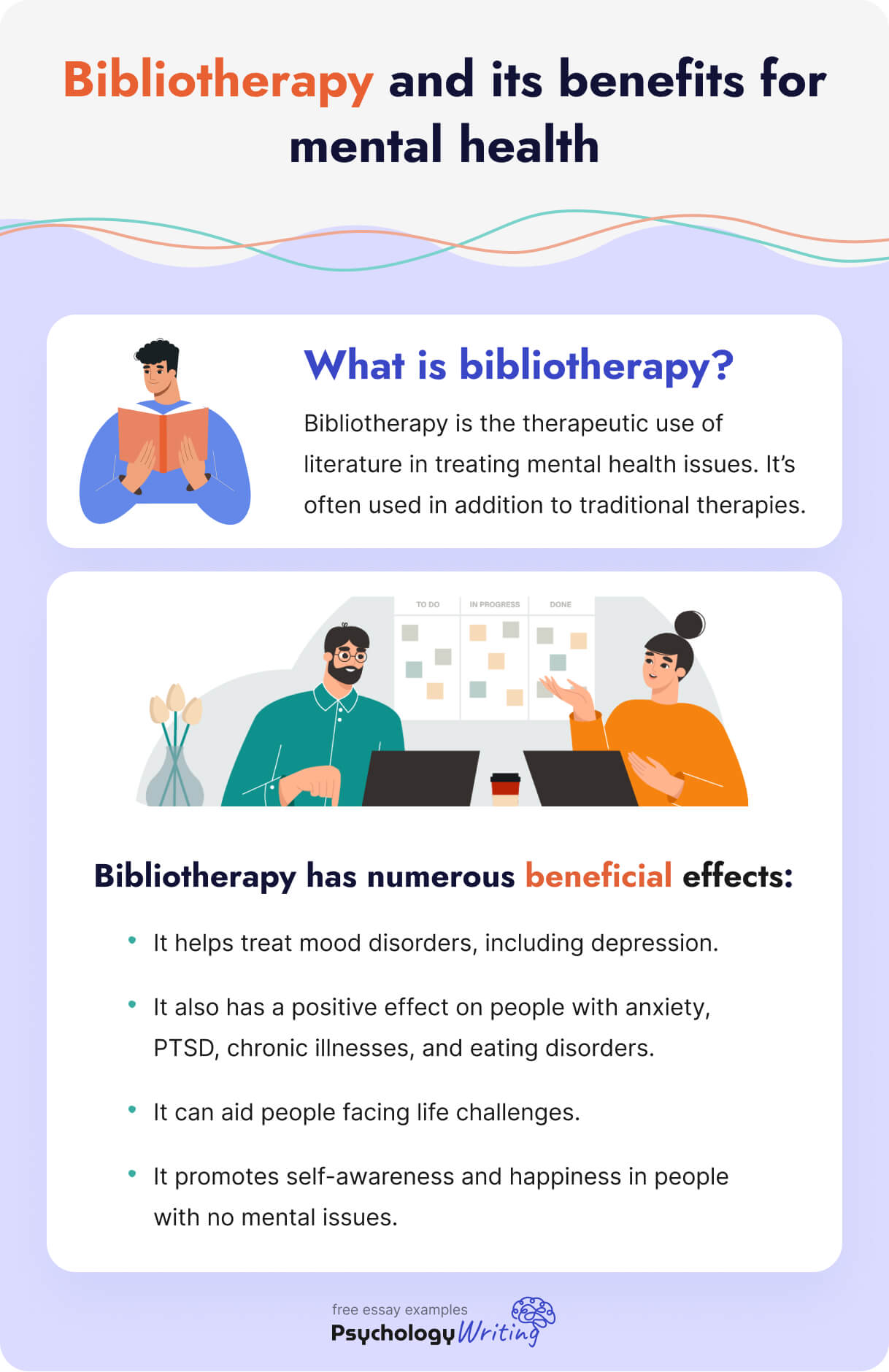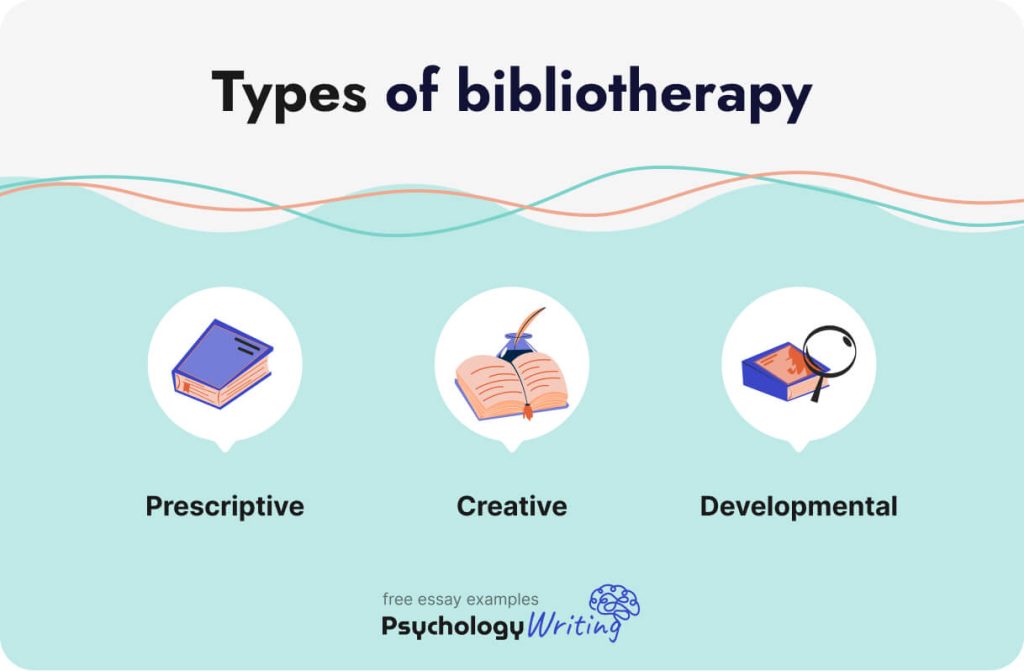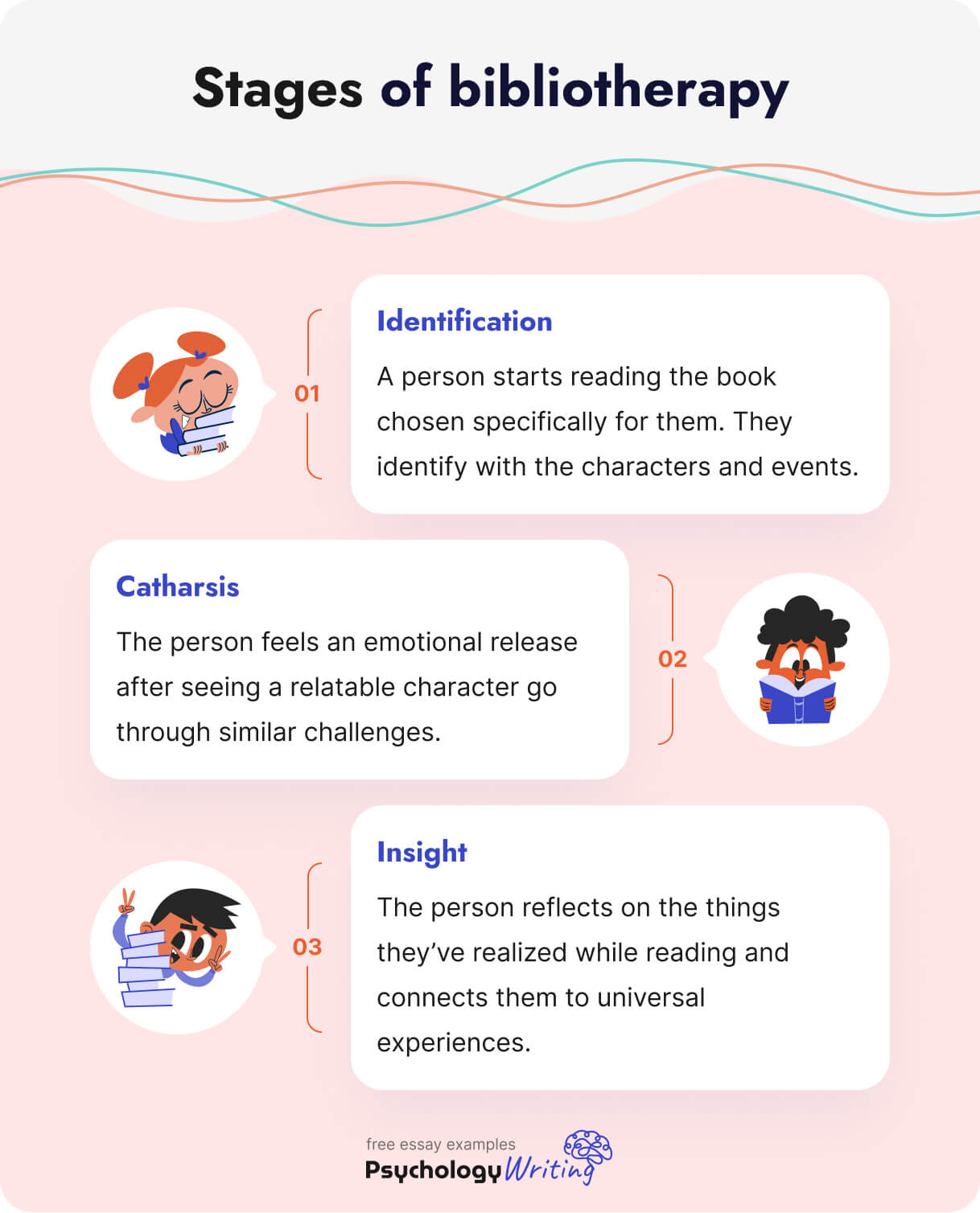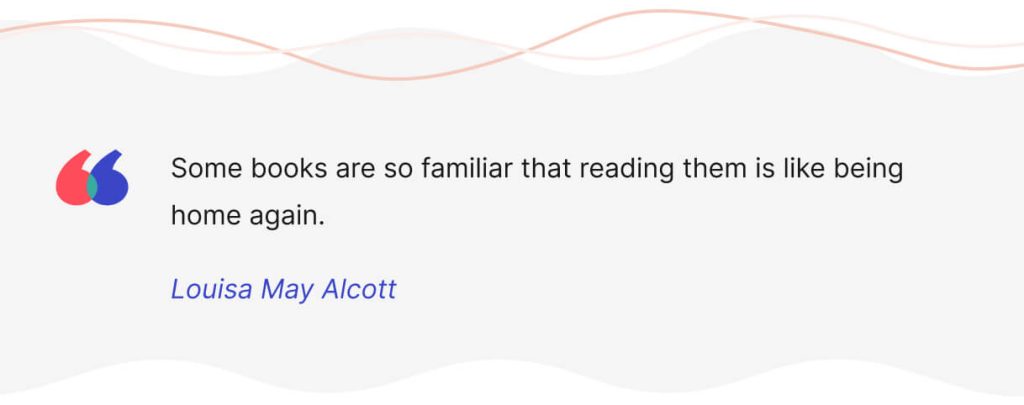It’s no secret that words have power and can significantly affect our emotions. The right words, especially when woven together in literary works, have the ability to evoke feelings or inspire us to seek change.
Bibliotherapy uses this power of words and stories to help patients cope with emotional struggles and life transitions. This treatment can be exceptionally beneficial for students who find it hard to articulate their concerns. In this article, our experts will describe the benefits of bibliotherapy, explain how it works, and provide insights into its application.
📚 What Is Bibliotherapy?
Have you ever experienced a sense of relief after reading a book that deeply resonated with you? The French philosopher Charles de Secondat once remarked, “I’ve never known any trouble that an hour’s reading didn’t assuage.” This statement essentially explains the concept of bibliotherapy.
The term itself is derived from the Greek words “biblio,” meaning “book,” and “therapeia,” which translates as “to help medically.” More contemporary terms like “bibliocounseling” and “book therapy” are also used to describe the practice of using stories as a form of treatment.
The power of this approach lies in the connection that a reader establishes with the characters and experiences portrayed in the story. Patients are encouraged to reflect on their thoughts, feelings, and observations inspired by the book and discuss them in counseling sessions with a bibliotherapist.
At its core, bibliotherapy shares similarities with creative therapies such as art and dance therapy. For that reason, a patient’s emotional response to the narrative is deemed far more significant than a mere intellectual understanding of the text. That’s why even those who didn’t enjoy reading in high school often appreciate bibliotherapy.

History of Bibliotherapy
The first mention of using books to improve mental health goes back to Ancient Greece, where libraries were revered as sacred places with healing powers. Historian Diodorus Siculus noted the construction of a room in Egypt dedicated to storing books during the time of King Ramses II, naming it the “House of Healing for the Soul.”
In the early nineteenth century, physicians like Minson Galt II and Benjamin Rush started to use reading books as an intervention method in rehabilitation and the treatment of mental health disorders. Later, during World Wars I and II, literature was used to help soldiers returning from war cope with physical and emotional traumas.
The term “bibliography,” still in use today, was coined in 1916 by Samuel Crothers in his article “A Literary Clinic,” published in The Atlantic Monthly. Crothers explained that books can evoke various emotions in readers, causing them to feel relaxed, angry, or motivated, depending on what is needed. He emphasized the importance of personalized book selection tailored to each person undergoing treatment.
Advancements in bibliotherapeutic practices continued in 1950 when Caroline Shrodes, the author of The Conscious Reader, proposed a theory highlighting the influence characters in narratives exert on readers who identify with them.
Today, bibliotherapy is used to help patients manage a wide range of problems, from personal issues and mental health conditions to degenerative illnesses. Educators also apply this technique to facilitate self-improvement among children and parents alike.
🔍 What Bibliotherapy Can Treat
While bibliotherapy is no replacement for traditional treatments when it comes to serious mental issues, it can serve as a valuable adjunct. For instance, it’s great for reinforcing specific concepts or demonstrating behavioral strategies.
Book therapy is effective in addressing mood disorders like depression, as well as other conditions, including:
- anxiety,
- PTSD,
- chronic pain,
- eating disorders,
- addictions,
- communication difficulties,
- low self-esteem, and others.
Even those without mental health issues can benefit from this treatment, as it promotes happiness, relaxation, personal growth, and self-discovery.
Besides being a great medicine for psychological issues and a contributor to overall well-being, book therapy also provides guidance during challenging situations. It helps resolve family conflicts or problems at work by encouraging people to consider various perspectives and find solutions to their dilemmas.
✨ Benefits of Bibliotherapy
One of the biggest benefits of bibliotherapy as a treatment method is that it creates a safe space for people to openly discuss complex emotional problems that they might find difficult to approach head-on. Since book therapy allows patients to view issues through the prism of a character, they feel more comfortable to talk about these problems happening to someone else while reflecting on their own situation.
For this reason, such an approach is often used for abused children to help them open up. A librarian licensed in bibliotherapy would have a child read a few chapters from a story that mirrors their own experiences and then discuss with them what happened in the story or how a character feels. Eventually, the librarian will transition from the fictional narrative to the child’s situation. By that point, the child should feel more comfortable and ready to share.
Research confirms the efficacy of bibliotherapy:
- Studies show that while we’re reading, our mirror neurons become active. These neurons help us relate to others and empathize. Their activation allows people to improve their social skills, recognize the emotions of others, and understand their own feelings.
- According to research, reading has multiple cognitive benefits, including mental stimulation, expanded knowledge, and improved vocabulary.
- Studies demonstrate that after successful book therapy, patients feel less lonely. They also develop valuable coping skills that contribute to their mental well-being.
- Research also revealed that reading calms the mind and lowers stress levels by reducing the production of the stress hormone cortisol and increasing the levels of dopamine and serotonin.
💡 Types of Bibliotherapy
There are three types of bibliotherapy: prescriptive, creative, and developmental. Each of them serves a different purpose and uses different books as treatment. We will now discuss these types in more detail.

Prescriptive Bibliotherapy
Prescriptive bibliotherapy is synonymous with self-help literature. During treatment, a therapist suggests to a patient a non-fiction book that suits their needs and addresses their concerns. For instance, it can be a book about changing thought patterns, managing stress, or achieving a work-life balance.
This form of bibliotherapy is usually applied within clinical or therapeutic environments, such as hospitals and institutional libraries.
Creative Bibliotherapy
Unlike the previous type, creative book therapy uses fiction to enhance a patient’s psychological well-being. Reading imaginative literary works with compelling characters and storylines evokes positive emotions. This triggers the release of serotonin, helping patients relax and escape from reality.
Another important aspect is that, unlike non-fiction, novels or poetry encourage people to empathize with and relate to the characters. For this reason, it can be easier to connect with fictional literature and see your own story through the lens of a character. This helps patients overcome their discomfort and share their stories freely.
Creative bibliotherapy is mainly used in group sessions, where participants can exchange thoughts and share experiences.
Developmental Bibliotherapy
Developmental bibliotherapy is primarily used in schools or youth service facilities for several purposes:
- To explain complex social concepts to teenagers,
- To help children overcome a difficult time or cope with puberty,
- To support gifted children.
During the sessions, children are provided with a structured reading program designed specifically for them. Many libraries in America offer advisory services where therapists help students to research a topic of interest. Additionally, libraries may provide books and novels covering diverse subjects to address various concerns.
📌 How Bibliotherapy Works: Main Concepts & Stages
When faced with significant life changes, overwhelming stress, or mental health issues, it’s natural to feel lost, especially when no one in your circle has gone through a similar experience. In such situations, bibliotherapy can offer insights into your life and provide emotional relief.
The process of bibliotherapy consists of three stages:
- Identification with the character,
- Catharsis, or an emotional release,
- Insight sometimes coupled with universalization.
Let’s examine each stage in more detail.

Stage 1: Identification with the Text
The therapy starts once the patient starts reading the book chosen especially for them. They begin identifying with the text as they feel a connection between the story and their life. This moment is often described as the point where the lines between the character and the reader blur, merging them into one.
Stage 2: Cathartic Relief
The effectiveness of stories in therapy lies in their ability to prompt readers to empathize with the story and its character, eventually leading to a cathartic release.
Catharsis as a concept has been known since the times of the Ancient Greeks. In his treatise Poetics, Aristotle wrote about the cleansing effect of witnessing a tragic play. Since then, this effect of storytelling on the human psyche has continued to be used in arts, literature, and therapy.
Viewing the world through the lens of a relatable character offers a new outlook on familiar situations. As the character deals with similar challenges, the reader’s sense of identification builds up to an emotional release as they express their pent-up feelings.
Stage 3: Insight and Universalization
In the final stage, the person reflects on the insights gained. They compare and contrast their own story with that of the character, drawing conclusions from the analysis.
Sometimes, the process also involves universalization, where a person recognizes their experience and that of the character as universal, that is, shared by many.
If the patient successfully integrates these insights into their actual experiences, they are likely to see an improvement in their mental state and behavior.
🎯 Choosing the Right Books for Reading
The effectiveness of bibliotherapy directly depends on how well the chosen literary work aligns with three fundamental principles:
- Safety. The reader must feel safe to explore the emotions after reading the book. That’s why the writing should be authentic and trustworthy.
- Connection. Understanding and empathizing with a character’s emotions are pivotal in bibliotherapy. Therapists usually choose books where the protagonist undergoes experiences similar to those of the reader.
- Action. Engaging in therapy should empower a person to develop self-awareness and find the motivation to move forward. In the end, the patient should feel prepared to overcome their traumas, whether through adopted coping mechanisms or a newfound sense of freedom.
If a therapist adheres to these principles, the patient will gradually lower their defenses and feel more comfortable sharing their experiences.
🤔 Who Offers Bibliotherapy?
It’s totally acceptable to select reading materials independently and practice self-prescribed bibliotherapy. It’s also a cheaper option since books are easily accessible in shops and libraries. Still, collaborating with a professional is a much better option.
Why? Well, a licensed therapist can assist you in multiple aspects that you may find challenging to deal with on your own, such as:
- Choosing suitable reading material,
- Analyzing your response to the text,
- Gradually opening up about your concerns,
- Connecting your insights to a broader context.
Although many mental health practitioners use book therapy, only those who adhere to the official standards established by The International Federation for Biblio/Poetry Therapy (IFBPT) are recognized as professionals. Their credentials include the following:
- Certified Applied Poetry Facilitator (CAPF)
CAPF professionals must hold a bachelor’s degree and possess experience in psychology. They usually work with people dealing with severe mental health issues. Their primary focus is to assess and identify patients who may benefit from mental health assistance. - Certified Poetry Therapist (CPT)
Certified poetry therapists must undergo post-graduate mental health training. They conduct private sessions with patients with psychological issues. - Registered Poetry Therapist (PTR)
Such specialists undergo post-graduate mental health training and complete advanced coursework to obtain official certification.
Note that in these credentials, the term “poetry” encompasses all forms of text, not just poetry itself.
How to Choose a Bibliotherapist
The easiest way to find a professional bibliotherapist is by searching “bibliotherapy + your city” on Google. Alongside verifying the credentials mentioned above, consider looking for titles such as LMFT, LCSW, PsyD, PhD, and LPC when looking for a specialist.

Every bibliotherapist has a unique approach, so it’s essential to find someone who aligns with your needs. To make sure the therapist is the right fit for you, consider asking them the following questions:
- How will they address your specific concern?
- Have they encountered a similar issue in the past?
- What is their treatment process?
- What is the anticipated duration of the treatment?
If there’s anything that bothers you and you feel like it will be easier for you to discuss your problems from someone else’s perspective, then give bibliotherapy a try. It may be just what you need to get in touch with yourself and learn helpful coping techniques. Besides, you’ll get to read and discuss fantastic books that you probably wouldn’t have stumbled upon yourself.
🏆 Tips for Practicing Bibliotherapy
For bibliotherapy to yield positive results, it’s essential to cultivate a reading habit and learn to make the most out of your sessions. Here are the best tips from book therapy professionals to help you make your experience effective:
- Designate a specific time of the day dedicated to reading.
- Find a comfortable reading environment.
- Determine the duration of your reading sessions, starting with at least 20 minutes per day and adjusting if needed.
- Clear your mind of distractions and immerse yourself fully in the story during the reading sessions.
- Stay committed to your reading schedule, even if it feels challenging.
- Reward yourself after your reading sessions by doing something you enjoy.
- Participate in group reading sessions or discuss books with friends to gain diverse perspectives and foster social connections.
- Practice positive self-talk while reading to cultivate a mindset of positivity and productivity.
🎁 Bonus: List of Bibliotherapy Recommendations
Want to try reading a couple of self-help books to see if bibliotherapy is right for you? If so, then definitely check out this list. We’ve compiled the best self-improvement guides for students according to what they can help you with.
📍 Anxiety
- Overcoming Anxiety: A Self-Help Guide Using Cognitive Behavioral Techniques by Helen Kennerley.
This book introduces a complete recovery program based on cognitive behavioral therapy (CBT.) - Overcoming Anxiety, Stress, and Panic: A Five Areas Approach by Chris Williams.
This book discusses the five-area model of CBT. It explains how this approach can help people who experience a range of symptoms associated with anxiety, stress, and panic. - The Anxiety and Phobia Workbook by Edmund J. Bourne.
This workbook is designed to help people develop coping strategies for anxiety, phobias, and panic attacks.
📍 Grief and bereavement
- On Grief and Grieving by David Kessler and Elisabeth Kubler Ross.
This book discusses the ways people experience grief. In particular, it introduces the famous five stages model. - How to Survive Bereavemen by Andrea Kon.
This author of book aims to prove that there is life after death and explains that bereavement is a journey from pain to peace. - The Courage to Grieve by Judy Tatelbaum.
This self-help book can teach you helpful strategies for dealing with grief, loss, and disappointment.
📍 Depression
- Mind over Mood: Change How You Feel by Changing the Way You Think by Dennis Greenberger.
This workbook uses the authors’ experiences as clinicians and teachers who use CBT to help patients understand their behavior and improve their mood. - Living with a Black Dog by Matthew Johnstone.
This short book is perfect for families and caregivers. It uses humorous illustrations to explain what depression is and what it feels like. - Depression: The Common Sense Approach by Tony Bates.
This is an accessible book that discusses cognitive behavioral therapy strategies and more.
📍 Eating disorders
- Give Food a Chance by Julie O’Toole.
This book offers a new perspective on child eating disorders and provides valuable insights for parents and professionals. - Brave Girl Eating: A Family’s Struggle with Anorexia by Harriet Browne.
Here, you can read a real-life story of a girl’s recovery from anorexia. The book also describes a family-based treatment developed at the Maudsley Hospital in London.
📍 Mindfulness
- Wherever You Go, There You Are by Jon Kabat-Zinn.
This book explains the concept of mindfulness and how to use meditation skills in daily life to deal with stress or illness. - Mindfulness: A Practical Guide to Finding Peace in a Frantic World by Mark Williams.
This is a practical guide that will help you deal with stress, anxiety, and depression. - Quiet the Mind by Matthew Johnstone.
This is a jargon-free guide on meditation for beginners. It discusses practical ways to manage obstacles that prevent you from becoming genuinely mindful.
📍 Stress management
- Overcoming Stress: A Self-Help Guide by Lee Brosan.
This guide aims to make people’s lives more enjoyable by teaching them how to program their minds into thinking positively. - The Relaxation and Stress Reduction Workbook by Elizabeth Robbins Eshelman, Martha Davis, and Matthew McKay.
This handy workbook offers step-by-step guidelines for practicing progressive relaxation, visualization, mindfulness, and acceptance. - Coping with Stress at University: A Survival Guide by Stephen Palmer.
This guide discusses the main problems students experience during their college life and explains how to manage them effectively.
✅ Key Takeaways
Now, you know that the magic of literature can also help with mental struggles. If you’re still unsure about trying bibliotherapy, think about its fantastic advantages as a treatment method for students:
- Books are easily accessible, so almost anyone can use this treatment.
- Reading provides comfort and gives hope to those struggling with mental health problems.
- Looking at yourself through the prism of a character helps open up.
- Bibliotherapy connects people by showing them they are not alone.
- Millions of books published today talk about psychological struggles, so everyone can find a work that reflects their experience.
And with that, we finish our guide. Give bibliotherapy a chance, and have fun on your journey!
🔗 References
- Bibliotherapy: Psychology Today
- What Is Bibliotherapy?: BetterHelp
- Bibliotherapy: Background, Application, and Research: UNI ScholarWorks
- Bibliotherapy: Definition, Types, Techniques, and Efficacy: Verywell Mind
- Can Books Really Cure Depression? This Therapist Thinks So: The World Economic Forum
- Bibliotherapy: What It Is, How It Helps, and More: Psych Central
- Bibliotherapy: Helping Students, One Book at a Time: Ohio State University
- Health Benefits of Reading Books: WebMD
- Bibliotherapy: Its Processes and Benefits and Application in Clinical and Developmental Settings: UCL Discovery

